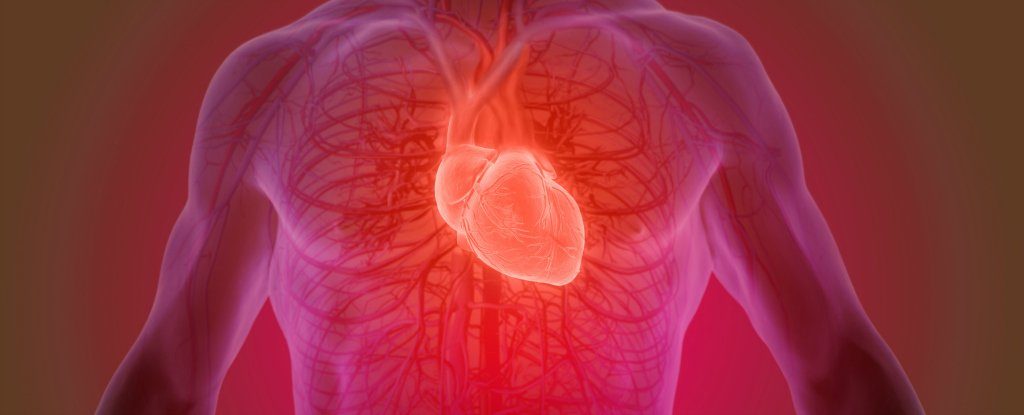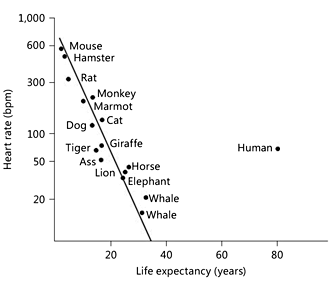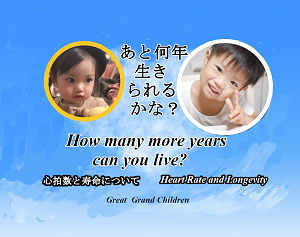Hi everyone how are you? Today’s theme is from the issue of the healthy program on Japanese public broadcaster NHK the other day, the contents of which was about ” heart rate and longevity “.
Longevity? Everybody think that only God knows how many years I can live, right? But I found it very interesting in between the number of pulse and a span of life, so I’d like to write about it.
目次
Heart Rate as a Measure of Life Span
I quote, first, this article which is a little old data but reliable from the New York Times that says, a new study, published in Heart, suggests that a higher resting heart rate is an independent predictor of mortality — even in healthy people in good physical condition.
Danish researchers gave physical exams to 5,249 healthy middle-aged and elderly men beginning in 1971.
In 1985 and 1986, they tracked survivors, of whom there were 3,354. Of these, 2,798 had sufficient data on heart rate and oxygen consumption for the analysis. Researchers followed them through 2011.

After controlling for physical fitness and many other health and behavioral factors, they found that the higher the resting heart rate, the greater the risk for death.
Compared with men with rates of 50 beats a minute or less, those at 71 to 80 beats had a 51 percent greater risk. At 81 to 90 beats, the rate of death was doubled, and over 90 it was tripled.
“If you have two healthy people,” said the lead author, Dr. Magnus Thorsten Jensen, a researcher at Copenhagen University Hospital Gentofte, “exactly the same in physical fitness, age, blood pressure and so on, the person with the highest resting heart rate is more likely to have a shorter life span.”
It has long been known that life span is inversely related to resting heart rate in most organisms.
This association between heart rate and survival has been attributed to the metabolic rate, which is greater in smaller animals and is directly associated with heart rate.
Studies have shown that heart rate is related to survival in apparently healthy individuals and in patients with different underlying cardiovascular diseases.
A decrease in heart rate due to therapeutic interventions may result in an increase in survival. However, there are many factors regulating heart rate, and it is quite plausible that these may independently affect life expectancy.
Nonetheless, a fast heart rate itself affects the cardiovascular system in multiple ways (it increases ventricular work, myocardial oxygen consumption, endothelial stress, aortic/arterial stiffness, decreases myocardial oxygen supply, other) which, in turn, may affect survival.
In this brief review, the effects of heart rate on the heart, arterial system and survival will be discussed.
Semilogarithmic relation between resting heart rate and life expectancy in mammals

Let’s check our pulse
First, we find the pulse, as shown below,

Arteries run closely to the surface of the skin at the wrist and neck, making the pulse particularly easy to find at these points.
Here are the simple steps needed to take a pulse at the wrist. This is known as the radial pulse:
Turn one hand over, so it is palm-side up.
Use the other hand to place two fingertips gently in the groove on the forearm, down from the fold of the wrist and about an inch along from the base of the thumb.
When the position is right, you should feel the pulsation of your heart beat and you know the number of pulse per minute.
Then, you come to know your longevity from the following chart, of course this is only a guide though.
| heart rate/min | longevity as a guide |
| 40 | your life expectancy 119 years old |
| 44 | ” 108 ” |
| 48 | ” 99 ” |
| 52 | ” 91 ” |
| 56 | ” 85 ” |
| 60 | ” 79 ” |
| 64 | ” 74 ” |
| 68 | ” 70 ” |
| 72 | ” 66 ” |
| 76 | ” 63 ” |
| 80 | ” 59 ” |
How do you lower your heart rate and longevity ?
If the heart rate is suddenly spiking in response to issues such as emotional stress or environmental factors, addressing the cause is the best way to reduce the heart rate.
Ways to reduce sudden changes in heart rate include:
![]() practicing deep or guided breathing techniques, such as box breathing
practicing deep or guided breathing techniques, such as box breathing
![]() relaxing and trying to remain calm
relaxing and trying to remain calm
![]() going for a walk, ideally away from an urban environment
going for a walk, ideally away from an urban environment
![]() having a warm, relaxing bath or shower
having a warm, relaxing bath or shower
![]() practice stretching and relaxation exercises, such as yoga,
practice stretching and relaxation exercises, such as yoga,

Yoga class in meditation pose, with man in middle on yoga mat.
Practicing meditation or yoga may help to lower the heart rate.
Many lifestyle habits can contribute to lower the resting heart rate in the long term.
They may also improve a person’s ability to maintain a healthy heart rate during physical activity and stress.
The following tips may help to lower the heart rate in the long term:
1. Exercise: The easiest and most effective way to achieve a lasting lower heart rate is to do regular exercise.
2. Stay hydrated: When the body is dehydrated, the heart has to work harder to stabilize blood flow. Throughout the day, drink plenty of sugar- and caffeine-free beverages, such as water and herbal tea.
3. Limit intake of stimulants, such as caffeine and nicotine: Stimulants can cause dehydration, increasing the heart’s workload.
4. Limit alcohol intake: Most forms of alcohol dehydrate the body. Alcohol is also a toxin, and the body must work harder to process and remove it.
5. Eat a healthy, balanced diet: Eating a varied diet rich in fruits, vegetables, lean proteins, nuts, and legumes can help to improve the health of the heart, as well as overall health.
Foods and supplements rich in antioxidants and healthy fats can lower blood pressure and make it easier for the heart to pump.
Heart-healthy nutrients include:
![]() omega-3 fatty acids, found in fish, lean meats, nuts, grains, and legumes
omega-3 fatty acids, found in fish, lean meats, nuts, grains, and legumes
![]() phenols and tannins, found in tea, coffee, and red wine (in moderation)
phenols and tannins, found in tea, coffee, and red wine (in moderation)
![]() vitamin A, found in most leafy, green vegetables
vitamin A, found in most leafy, green vegetables
![]() dietary fiber, found in whole grains, nuts, legumes, and most fruits and vegetables
dietary fiber, found in whole grains, nuts, legumes, and most fruits and vegetables
![]() vitamin C, found especially in citrus fruits, leafy greens, and bean sprouts
vitamin C, found especially in citrus fruits, leafy greens, and bean sprouts
A variety of supplements are available for purchase online, including multivitamins, omega-3 supplements, and fiber supplements.
6. Get enough sleep: A chronic lack of sleep puts stress on the whole body, including the heart. Most adults should get between 7 and 9 hours of sleep a night.
7. Maintain a healthy body weight: Extra weight also puts stress on the body and heart.
8. Reduce or resolve sources of substantial long-term stress: Stress caused by work, caring for a loved one, or financial burdens all cause the heart and the rest of the body to work harder, to maintain a normal rhythm and flow.
9. Seek counseling or psychological services: Traumatic experiences, grief, and certain mental health conditions stress the body and can impact brain chemistry, making it harder for people to cope with everyday activities and stressors.
10. Get outdoors: Research shows that people who spend more time in nature, even by taking a short walk in the woods or a park, tend to be happier and less stressed than people who do not.
11. Practice relaxation techniques: Activities that increase self-awareness and mindfulness, such as meditation and guided visualization, can help to reduce stress when practiced routinely.
Finally, I hope all of you would follow the above recommendations and enjoy longevity!
Besides, please visit the following “Supercentenarian, 116” thanks
